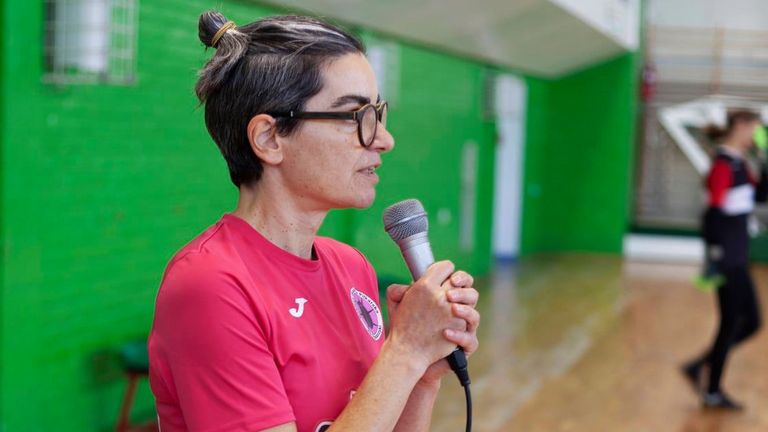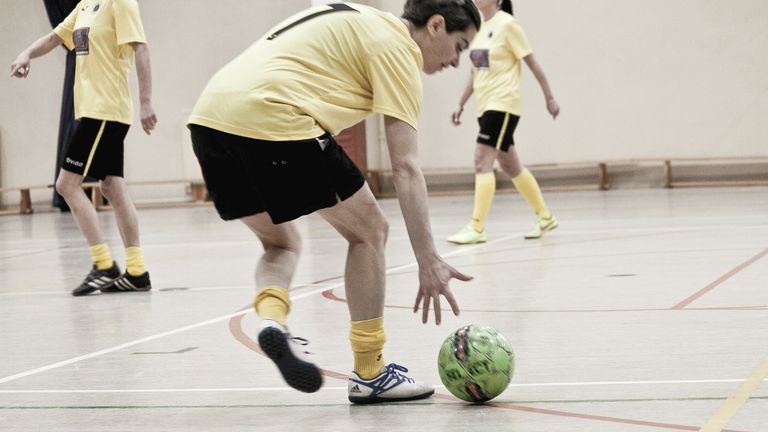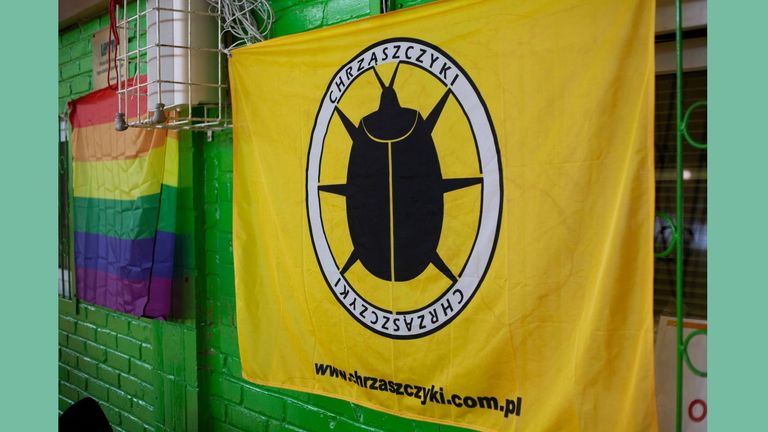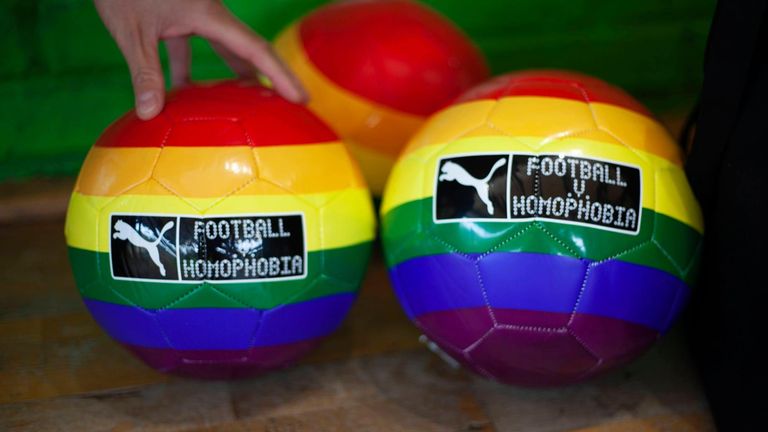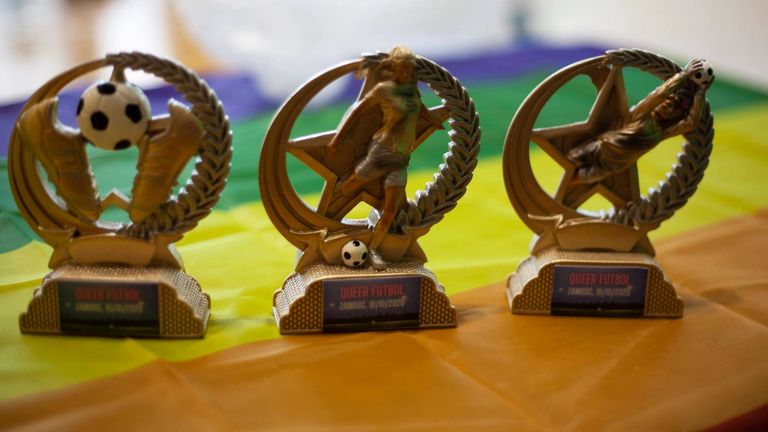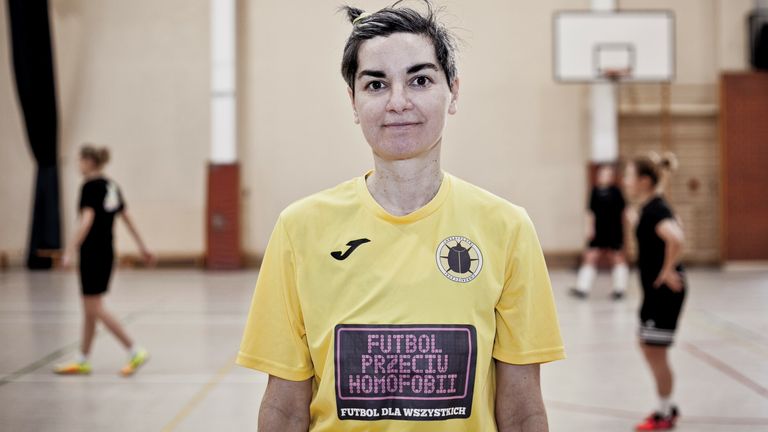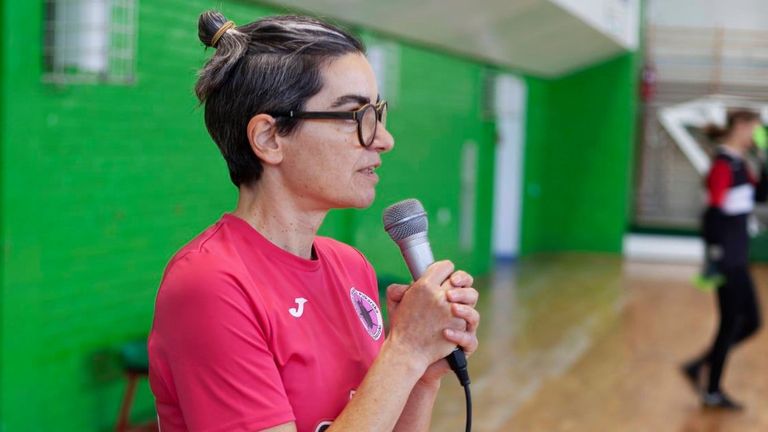
In an indoor sports hall in the Polish city of Zamosc, two women’s football teams are preparing to kick off a game when pepper spray cans are thrown across the floor, spreading gas into the hall.
The players are forced to evacuate while the air clears but outside the hall, they come face to face with those responsible – local hooligans who should have been watching the men’s club they support in a fourth-division league match being held in the nearby stadium.
“Some of us encountered them in the corridors. Fortunately, no one was badly affected by the gas and it didn’t get physical,” says Suzi Andreis, speaking to Sky Sports from Warsaw. She is reflecting on the event, titled ‘Queer Futbol’, that she organised on a Saturday afternoon last October.
“When things like this happen, I’m more outraged than scared. The police had called us in the morning and told us they were going to close our event and that no one would get in.”
Yet it’s not the disruption that frustrates her the most. “It was supposed to be an open event. While I’m glad on one hand that the police were there, because it would be worse without them, on the other hand, they don’t understand why we’re doing it. We wanted people to come and watch. We need visibility.”
Andreis is an activist fighting against discrimination in a country ranked lowest in the whole of the European Union for LGBT+ rights. She is also passionate about football, and KS Chrzaszczyki – the club she founded – has become a vital community space for women like her living in and around the Polish capital. Its name translates into English as ‘Beetles FC’ and Andreis is rightly proud of her thick-skinned, diverse family of players.
The Zamosc event was supposed to be a larger tournament, but in this part of south-eastern Poland, it proved hard to attract teams. The area surrounding the city is a so-called ‘LGBT-free zone’ and the location was chosen deliberately, to make a statement as well as provide an inclusive sporting space for local women. Resolutions against ‘LGBT ideology’ taken by over 100 local authorities across the nation have led to a proliferation of these ‘zones’, but Andreis is undeterred.
Football versus fascism
Originally from Turin, she moved to Warsaw in the late 1990s to continue studying Slavic Studies. Calcio culture had begun to lose its appeal as she reached her late teens, with her club Torino forced to play in the unpopular concrete bowl of the Stadio Delle Alpi and attitudes around the men’s game seemingly stuck in the Stone Age. Once in Poland, she joined a mailing list of lesbians and other women who were coming to terms with their sexuality.
“We organised a summer meeting in a park and played football. We soon put it on again and by the next year, it was pretty much weekly. It was the beginning of Chrzaszczyki, and I was the person who really took it on.
“We never advertised the games as being ‘for lesbians’ but it was clear that most people who were coming were gay or bi. We created a space where these women felt comfortable. For many of them, that was a feeling they were having in an LGBTQ+ environment for the first time.
“Some had problems with internalised homophobia and admitting to themselves that they were gay. The football games became a way of coming to terms with that for many women.”
Recapturing their childhood enthusiasm for the game away from societal pressures was enough at first. They accepted an invite to the 10th International Gay and Lesbian Football Association World Cup in London in 2001 but “barely got past the halfway line”, recalls Andreis, with teams from Germany, the USA, and the Netherlands taking the competition very seriously. However, within a few years, she was regularly putting on tournaments herself.
“From this point on, we realised it was becoming more about the football than just lesbians and bi women meeting up. We started searching for better pitches, and better players started joining the club. It pushed the level higher – it was a natural evolution.”
Around this time, Andreis could sense the political mood shifting to the right in Poland. The Chrzaszczyki tournaments always had a message – standing against sexism, or celebrating visibility – but against a backdrop of Pride parade bans in Warsaw and neo-fascist groups with football connections getting more organised, the campaigning element of the club’s identity became more pronounced.
“We could observe these groups growing. There are two ways they appear in society – one is in a suit and tie, the other is as a football supporter, usually a skinhead. In 2005, they had home-made banners, then later the banners were all printed. For 10 to 15 years, fascism was growing but no one was saying it.”
In 2015, the right-wing Law and Justice party, which has strong ties to the country’s powerful Catholic church, won the Polish parliamentary election with an outright majority. “Since then, everyone knows the history,” says Andreis. A legal change allowed the government to appoint the heads of TVP, the largest Polish television network, and public radio. By autumn 2019, 54 members of the Parliamentary Assembly of the Council of Europe were labelling TVP “a propaganda channel for the ruling party”.
Through it all, Chrzaszczyki have continued and their reputation has grown across Europe as an LGBT+-inclusive club for women and non-binary people. “We’re the only such club here in Poland but we are very local to Warsaw,” says Andreis. “Our work has been extremely good in terms of helping individuals and growing the amateur women’s football community in the capital.
“But we’ve never been able to get enough money to expand. We get positive comments but sport is considered a secondary part of culture, I feel. All my friends throughout Europe who are sports activists say the same thing.”
Tackling the patriarchy
The pandemic put the brakes on Chrzaszczyki as a club but last summer, Andreis was so outraged by a fresh development in Polish opposition to LGBT+ rights that she mobilised her football network once again. Towns and cities in the country that had declared themselves ‘LGBT-free zones’ discovered that their applications for European Union funding were being denied as a result, only for the government to step in and tell them they would get state money instead.
“It was a disgrace,” she says. “Some municipalities had got the news that they would lose partnerships or not be granted EU money. Then the Ministry of Justice granted one of the cities (Tuchow) more money than they would have got from the EU.
“I was so upset that it was the spark for me to call all my friends and say, ‘let’s do something’. The event in Zamosc was tough but we made it a success.
“It turns out that the men’s football game that was being played in the stadium is famous in the area for being one of the most aggressive fixtures, in terms of radical far-right people among the supporters. It was strange because we thought we’d be ignored.
“We tried to advertise – we had articles in local media and newspapers – but we thought ‘they don’t care about us’. If we were gay men, they would have come but for lesbians, I was quite sure that no one would be interested. But they still threw pepper spray at us.”
Despite the experience, Andreis hopes to put on more LGBT-friendly football events in so-called ‘LGBT-free zones’ and even though she appreciates that homophobia is more obvious in Polish men’s football, she says fear about sexuality and gender identity is peddled in the women’s game too.
“As for the hooligans, they treat male issues more violently,” she explains. “But the experience for women is totally different. This talk of a hierarchy and that homophobia hits men more than women, it’s part of the patriarchy culture.
“Even at this level, women are seen as being less important. I’ve been trying to use the specific term lesbophobia, but it hasn’t really become part of the public discourse yet.”
The ‘rock star’ and other role models
Lesbian Visibility Week is being celebrated in the UK but not in Poland. Andreis works in a school and would like to show examples of positive role models to the students – some world-famous sports stars, and others who are more relatable.
“I didn’t have role models like this when I was a teenager,” she adds. “The only lesbians out in sport were victims of homophobia, like Martina Navratilova and Jana Novotna – they were successful, but their sexuality was either silenced or the subject of jokes. That was the attitude.
“Now we have women like Megan Rapinoe – a superstar, a rock star! I’m sure it’s helpful, this kind of visibility. But she’s distant. Young people need role models around them in everyday life too. Look at us, we are here!”
Andreis and her fellow ‘Beetles’ will be scurrying back to sports halls and outdoor pitches now that the most recent Warsaw lockdown restrictions on activities have been lifted. As she looks back on two decades of Chrzaszczyki, she takes pride in the number of women who have told her how the club has changed their lives.
“Many say it was the beginning of a journey for them. It’s very moving, to say the least. Also, most of our events attract women in their early or late 20s and that’s a sign that we still live in the same cultural desert as I did when I was a teenager.”
As a Torino supporter, it was a familiar feeling back then for Andreis to be somewhat in the shadows. When the chance to celebrate did come along, it was seized upon. “Every Monday morning, the mood depended on the weekend result. When Torino won and Juve lost, it was wonderful!”
It was a more innocent time in her story, before politics, prejudice and pepper spray entered the fray. Andreis’ unfailing faith in football as a force for good is a breath of fresh air.
Lesbian Visibility Week runs from Monday, April 26, to Sunday, May 2.
Sky Sports is a member of TeamPride which supports Stonewall’s Rainbow Laces campaign. Your story of being LGBT+ or an ally could help to make sport everyone’s game. To discuss further, please contact us here.
